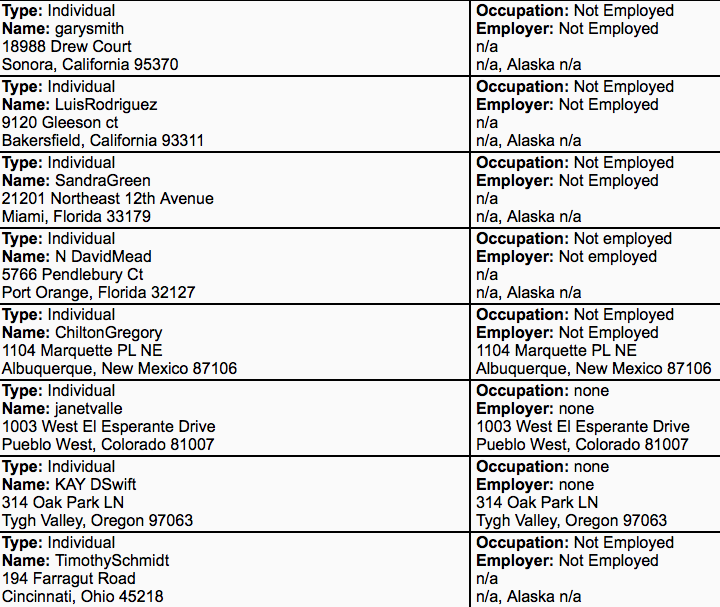Reps. Jonathan Kreiss-Tomkins and Jason Grenn, of Alaskans for Integrity.
EXTENSIVE FLOUTING OF ALASKA CAMPAIGN TRANSPARENCY LAWS
“Alaskans for Integrity” may be run by a group of Democrats in Anchorage. But they are running on funds that come from all over the nation — every place except Alaska.
The group is sponsoring a ballot initiative that would make it hard for many lawmakers to hold down meaningful jobs outside of their elected office, changing them from a citizen Legislature to a professional one — only those who could afford to serve would run.
The goal appears to be to target any legislator who works in oil or mining, preventing them from retaining jobs — or if they do so, preventing them from voting on legislation related to taxes on their industry, or on the industries in which any immediate family members work.
WHO IS BEHIND IT?
Rep. Jason Grenn, an Anchorage nonpartisan who aligned with House Democrats in Juneau, and Jonathan Kreiss-Tomkins, a solid Democrat, are the lead sponsors of the Integrity initiative. And the campaign behind it is soaking up a lot of money, almost all of it from Outside the state.
So while it looks Alaskan, it’s not. As of May 24, the committee had brought in $311,000 and no group had formed to oppose the measure. The largest contributors include a Massachusetts group called Represent.Us, which has put in $215,086.38.
A second big contributor is an admittedly Democrat surrogate group: End Citizens United, which put $12,131 into the Alaskans for Integrity campaign. End Citizens United, based in San Francisco, receives funds through the ActBlue app, just like Alaskans for Integrity does.
The rest of the money comes from individual donors in dribs and drabs — $3, $5, or $50 donations from people from New York to San Francisco. And a remarkable number of them are not legally reported to the Alaska Public Offices Commission. They are listed as “Unemployed.”
But reviewing the donors, it’s clear they are employed — they are just not saying how and who their employer is. Anyone donating $50 or more must indicate employer and job title.
There are dozens of $50 donations from people everywhere but Alaska who say they are unemployed but, according to Must Read Alaska’s crack research department, are definitely employed.
An example of just one snapshot taken from the pages upon pages of donations that are in blatant violation of Alaska’s transparency laws:

To review the thousands of non-transparent donations the group has received from Outside, follow this link.
A national campaign to collect money for this Alaska “anti-corruption” law has reached far and wide through the high-tech world of online fundraising and by use of the ActBlue tool. Yet it appears the founders of the Alaskans for Integrity cannot even follow the simplest rule from the Alaska Public Offices Commission, which is transparency about donors.
ACT BLUE, BUT NOT ACT LIKE JKT
Alaska’s campaign finance laws are clear: Donors must list their names, addresses, occupations and employers. The only exceptions are for random dollars that show up that cannot be traced to someone, but must be disclosed as anonymous, and are given a second look by APOC staff. If a campaign has too many anonymous donors, that will be a red flag.
Kreiss-Tomkins, one of the sponsors of the Integrity initiative, has a history of sloppy reporting. After MustReadAlaska questioned whether he was too busy, too disorganized, or simply a scofflaw on his report to APOC earlier this year, he hustled to fix the dozens of errors.
Kreiss-Tomkins report showed he had received more than $3,000 from out of state, which would have been a violation as a candidate; he also showed receiving a donation in February from a political action committee, also illegal; and received $1,000 in illegal donations from ASEA, the State employees union. He also had listed four donations twice on his APOC report.
The majority of his donors on his original filing omitted their job titles and employers, and many addresses were missing or clearly false, listing hometowns such as “Stanwood, Alaska.” Clearly, Jonathan Kreiss-Tomkins was having trouble dotting the i’s and crossing the t’s in his campaign finance reports.
By the time he corrected those problems, which appeared to be double entries, his $8,833 in donations were whittled down to $6,944, about a 22 percent error rate in his reporting. In the end, he made sure his out-of-state contributions came in just under the $3,000 limit, a legal squeaker for the lawmaker who attended Yale University but who left before graduating to run for the Alaska House.
WHAT DOES THE ‘INTEGRITY INITIATIVE’ DO?
The measure would make changes to laws related to state legislators’ conflicts of interest, prohibiting lawmakers from taking or withholding official actions that could substantially affect the financial interests of them or their immediate family, employer, or the employer of an immediate family member. It would also prevent lawmakers from voting on matters that impacts a person who gave more than $10,000 to the legislator or legislator’s immediate family in the preceding year.
For example, if a lawmaker’s parents own a liquor license, that lawmaker might not be able to vote on anything relating to alcohol laws in Alaska.
Under the initiative, legislators would be required to declare to a legislative committee any conflict of interest before voting on any matter that could have a significant financial impact on the legislator or the legislator’s immediate family or the industries in which they work, above and beyond the effect on the general public; the legislator would have to request to be excused from the vote, but could vote if a majority of members in the chamber voted to allow it.
There are other provisions in this sweeping initiative that relate to per diem, and whether lobbyists can pay for meals. The measure would prohibit legislators from receiving per diem allowances during a special session until a budget bill was passed.
ISN’T THERE A LAW THAT JUST PASSED THAT DOES THIS?
Yes. In fact, it passed on May 11.
In 2018, both the House and Senate passed HB 44, that mirrors the Alaskans for Integrity ballot initiative. The cosponsors were Reps. Gabrielle LeDoux, Scott Kawasaki, Chris Tuck, Louise Stutes, Ivy Spohnholz, Justin Parish, Zach Fansler, Geran Tarr, Harriet Drummond, Les Gara, Daniel Ortiz, Andy Josephson, and Kreiss-Tomkins. Grenn was not on the list.
In the Senate, only Sen. Bill Wielechowski was a sponsor, although the measure passed easily. HB 44 was amended by Sen. Kevin Meyer to mirror the initiative’s language.
The governor can now either sign it, allow it to go into law without his signature, or veto it.
If he signs it, the Dept. of Law must decide if the new law is so similar to the ballot initiative that the initiative is no longer valid. Gov. Bill Walker is expected to issue a statement in the coming weeks about what his administration will do next.
WHAT HAPPENS TO ‘ALASKANS FOR INTEGRITY’S’ MONEY?
If the measure doesn’t go forward to the ballot, Alaskans for Integrity will be free to use the money how it wants, and it will likely peel off whatever remains to support political action activity relating to accountability. In other words, the group will likely use the money to oppose Republicans who it doesn’t think lives up to its accountability and transparency standards.
But meanwhile, as this report hits, the group will likely have to spend a lot of staff time chasing down hundreds of donors and establishing their jobs and employers. After all, it’s about transparency in elections.
